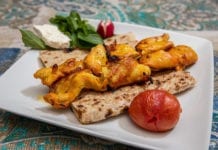Take away the tables and you could be in someone’s living room – someone with quirky, eclectic and very good taste. A weathered stone fireplace, a massive old armoire, oddly-shaped mahogany-framed mirrors, framed photographs vying for shelf space with old wine bottles: pleasantly eccentric clutter. It’s the kind of welcoming ambiance where old friends should gather, and on any given evening at Biga, they do. “I was worried! You haven’t been in for two weeks!,” a happy waiter shouts upon spying one of his favorite customers. At Biga, most of the diners are regulars, most of the waiters have been there forever and all the customers are treated like favorites.
You may encounter Tuck Curren somewhere about town, and if you do, you’ll see a sedate and dapper gentleman in the prime of middle age. But put him in a kitchen and the years fall away. He darts, he dashes (he once ran the New York City Marathon), he brims with boyish exuberance. “You must try this burrata cheese,” he shouts, threading his way between metal storage racks to a refrigerator in Biga’s impossibly cramped kitchen. “I found an old guy from Puglia who makes it by hand in L.A. and I have him ship it direct to me. I can’t believe how good this is!” (Indeed it is.) “And here, look at this.” He opens an oven and pulls out a steaming cauldron that’s medieval in its size and heft. Inside, a huge pork roast bubbles away in a bath of milk, rosemary, sage and juniper berries. “I love food like this.”
The roast, to be served that evening in a sauce made from the milk, is called Maiale al Latte and is an Italian regional dish from Marche, an obscure, forgotten section of Italy’s Adriatic coast. Yes, Curren does love recondite yet delicious recipes from parts of Italy that most cooks forget, but Biga’s menu has more familiar items. He tries to please his customers while gently nudging them out of their comfort zone. There’s a $20 prix-fixe menu that is full of New York-style staples “like your grandma used to make,” says Curren. The regular menu has more creative fare: pappardelle, perhaps, with a rich and totally authentic Bolognese ragu, or ravioli stuffed with creamy butternut squash. All the pasta is homemade and, whenever possible, all produce is local. But Curren will go a thousand miles to find the best. His red sauces are made with plum tomatoes shipped to him from a tiny family farm somewhere north of Sacramento.
Eating at Biga, you’d probably guess that Curren grew up in a big, loving, New York Italian family and went straight from there to a famous cooking school. You’d be wrong. He grew up in a tiny town just north of New York City and, while his parents were not Italian, they shopped like Italians, going to tiny, family-owned stores in search of the freshest vegetables, the finest salami. An avid reader, Curren plowed through cookbooks – he owns more than 600 – and taught himself to cook, holding exuberant weekly dinner parties for family and friends. By the time he reached Tulsa and was hired at Bodean, he was an accomplished cook. But he worked as a waiter and later as manager. “I had three young kids,” he explains, “and a waiter made more money than a chef.” Curren worked there for 20 years, and then in 2000 opened Biga.
Today, Biga is established, its dining room gilded with the patina of happy memories. Each of those hundreds of empty wine bottles that line the walls represents a memorable dinner and is signed by the patron who consumed it. “I like what I do, I like to help people and I like Tulsa,” says Curren. It’s therefore no surprise that each week he teaches cooking to Tulsa high school students. “Go out, travel the world, find great chefs and learn from them,” he tells the students. “I couldn’t do that, but thanks to my cookbooks, I had 600 teachers and not just one. I know what I want and I know how to make it, so when I run the kitchen I can get everything done and know how it should be.”

























